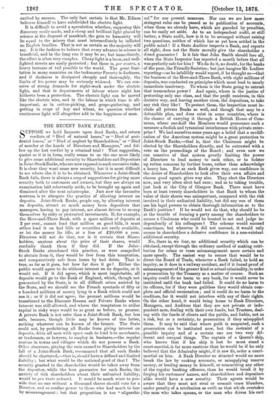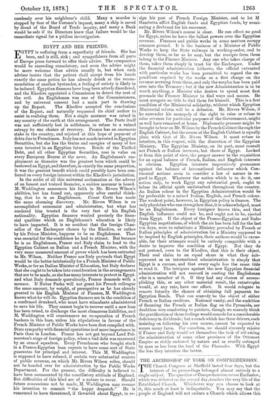THE RECENT BANK FAILURE.
SUPPOSE we hold Inquests upon dead Banks, and return verdicts of "Died of natural losses," or "Died of acci- dental losses," or "Died of neglect by Shareholders," or "Died of murder at the hands of Directors and Managers," and fol- low up the last verdict by a criminal trial That suggestion, quaint as it is in form, really seems to us the one most likely to give some additional security to Shareholders and Depositors in Joint-Stock Banks, who are now exposed to such excessive risks. It is clear they want some new security, but it is most difficult to see where else it is to be obtained. Whenever a Joint-Stock Bank fails, there is always a crop of suggestions for giving more security both to customers and owners, but they are always on examination laid reluctantly aside, to be brought up again and dismissed after the next catastrophe. Just now the favourite nostrum is to abrogate the practice of allowing interest on deposits. Joint-Stock Banks, people say, by allowing interest on deposits, attract so much money from depositors that managers, having to pay interest, are almost driven to recoup themselves by risky or protracted investments. If, for example, the Here-and-There Bank, with a spare million of deposits at 2 per cent., cannot lend that million on good bills, it must either lend it on bad bills or securities not easily available, or let the money lie idle, at a loss of £20,000 a year. Directors will not do that, nor is it certain that Share- holders, anxious about the price of their shares, would cordially thank them if they did. If the Joint- Stock Banks abandoned this practice, or were compelled to abstain from it, they would be free from this temptation, and comparatively safe from losses by bad debts. That is true, as far as it goes, but how far does it go ? Either the public would agree to do without interest on its deposits, or it would not. If it did agree, which is most improbable, all deposits would go to the Bank of England, which, though not guaranteed by the State, is in all difficult crises assisted by the State, and we should see the French spectacle of fifty or a hundred millions of money lying in a Bank which could not use it ; or if it did not agree, the peccant millions would be transferred to the Discount Houses and Private Banks where interest was still allowed, and where the temptation to utilise capital in risky ways would be as great as before, or greater. A private Bank is not safer than a Joint-Stock Bank, but less safe, because, though little may be known of the latter, nothing whatever can be known of the former. The State could not, by prohibiting all Banks from giving interest on deposits, drive all men with spare cash to lend it to merchants, or tradesmen, or lawyers, to employ in business,—the regular routine in towns and villages which do not possess a Bank. Other observers, pitying the ruin caused to Shareholders by the fall of a Joint-Stock Bank, recommend that all such Banks should be chartered,—that is, should have a defined and limited liability ; but what would be the national good of that The security granted to the shareholder would be taken away from the depositor, while the best guarantee for such Banks, the anxiety of rich shareholders about their unlimited liability, would be pro tanto reduced. It would be much wiser to pro- vide that no one without a thousand shares should vote for a Director, and so confine power to those who had much to lose by mismanagement ; but that proposition is too "oligarchi- cal" for our present manners. Nor can we see how more stringent rules can be palmed as to publication of accounts, when those we already have, which are guarded by penalties, can be easily set aside. As to an independent audit, or still better, a State audit, how is it to be arranged without raising two questions, neither of which has as yet been settled in the public mind ? If a State Auditor inspects a Bank, and reports all right, does not the State morally give the shareholder a direct guarantee ? Is it fair that John Smith should lose all, when the State Inspector has reported a month before that all was perfectly safe for him.? We do do it, no doubt, for the banks of the poor, the Friendly Societies; but just imagine Mr. Ludlow reporting—as he infallibly would report, if he thought so—that the business of the Here-and-There Bank, with eight millions of deposits,was conducted on principles which must lead to nearly immediate insolvency. To whom is the State going to entrust that tremendous power And again, where is the justice of protecting only one class, and that the profit receivers, in this decisive way, and leaving another class, the depositors, to take any risk they like ? To protect them, the inspection must in- clude all private Banks as well, and though that may be a defensible plan, and does exist in some countries, where is the chance of carrying it through a British House of Com- mons, where one-half the Members would pronounce such a measure a foolish and tyrannical interference with private enter- prise ? We had ourselves some years ago a belief that .a modifi- cation of the American system might be a great protection to Joint-Stock Banks,—that is, that the Chairman might be elected by the Shareholders directly, and be entrusted with a veto on the proceedings of the Board ; and even now we can conceive of that system greatly limiting the power of Directors to lend money to each other, or to bolster up rotten concerns by further loans, rather than acknowledge a heavy loss. But as each Bank gives way, our confidence in the desire of Shareholders to look after their own affairs and choose good agents gives way also. They elect the Directors now, and very often elect bad ones ; and as to taking trouble, just look at the City of Glasgow Bank. There must have been at least twenty shareholders in that Bank to whom the value of their shares was unimportant, compared with the risk involved in their unlimited liability, but did any one of them use his legal powers to obtain thorough information as to the Bank's position ? If he would not do that, why should he be at the trouble of forming a party among the shareholders to secure a Chairman who could be trusted to act and judge in- dependently of his colleagues ? The scheme would succeed sometimes, but wherever it did not succeed, it would only arouse in shareholders a delusive confidence in a non-existent additional security.
No, there is, we fear, no additional security which can be obtained, except through the ordinary method of making retri- bution for crime or crass mismanagement more certain and more speedy. The easiest way to secure that would be to direct the Board of Trade, whenever a Bank failed, to hold an inquiry, as it does in a railway accident, and if it found proof of mismanagement of the grosser kind or actual criminality, to order a prosecution by the Treasury as a matter of course. Such an inquiry could do no harm to any bank, for it would never be instituted until the bank had failed. It could do no harm to its officers, for if they were guiltless they would obtain com- plete and official exoneration ; and it could do no harm to the creditors, for it would not interfere with any of their rights. On the other hand, it would bring home to Bank Directors, Managers, and Auditors that they are not private or inde- pendent men, dealing with their own funds, but Trustees, deal- ing with the funds of clients and the public, and liable, not as a risk, but as a certainty, to prosecution if they misapplied them. It may be said that where guilt is suspected, such a prosecution can be instituted now, but the restraint of a possible inquiry and of a certain one are two very dif- ferent and unequal things. The captain of a Queen's ship, who knows that if his ship is lost he must stand a court-martial, is far more cautious than he would be if he only believed that the Admiralty might, if it saw fit, order a court- martial on him. A Bank Director so situated would no more break the law by cooking accounts, or misapplying reserve money, or lending money to himself, or committing any other of the regular banking offences, than he would break it by forging his customers' names, and shareholders and depositors alike would have a new security. Their agents would be aware that they must not steal or commit crass blunders, under penalty of a retribution as swift as that which overtakes the man who takes spoons, or the man who drives his cart agelessly over his neighbour's child. Many a murder is stopped by fear of the Coroner's inquest, many a ship is saved by dread of the Board of Trade inquiry, and many a Bank would be safe if its Directors knew that failure would be the immediate signal for a pitiless investigation.



































 Previous page
Previous page